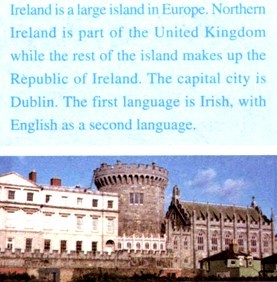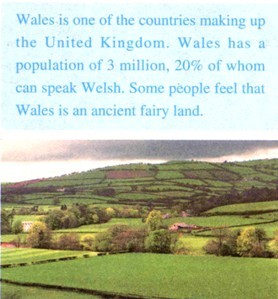人教高中英语高二上UNIT5-1
时间:2018-12-29 作者:英语课 分类:人教高中英语高二
The idea that England stands for Fish & Chips, Speakers' Comer, Big Ben and the Tower of London is past. Though many people around the world study its language, their view of British culture is sometimes narrow. The fact that Great Britain is made up of three countries is still unknown to many. Within Great Britain for many years now, there has been a growing movement to make the most of its cultural diversity -- to see it as it really is: a nation of different countries held together by a common language and culture.
The British Isles 2 are a group of islands that lie off the west coast of Europe. The largest island is called Britain, which is separated from France by the English Channel, which at one point is only 20 miles wide. It forms the mainland 3 of Great Britain and consists of three countries: Scotland 4 in the north, Wales in the west and England in the south and east. The island just west of Britain is called Ireland. Between Britain and Ireland, in the Irish Sea, lies the small Isle 1 of Man. The British Isles are surrounded by the Atlantic Ocean to the west, and the North Sea to the east.
The climate of the British Isles is mild with a lot of rain. In general, Scotland is colder throughout the year, and receives more rain. It rains a lot in England and Wales too, but the temperatures are more pleasant. In the summer months the difference in temperature Between London and the north can be as much as nine degrees! The coldest months are January and February, while the warmest months are July and August.
The culture of the people of the British Isles was influenced by the culture of the people on the European mainland. In the fifth century, people from different parts of northern Europe settled in England, bringing their own culture and language with them. Their languages formed the basis for English. Some of the native population moved to the inland, mountainous parts of the islands, to Ireland, Scotland and Wales, where they continued speaking their own languages.
In 1066 England was conquered 5 by the French. For the next few hundred years the upper classes spoke 6 French while the common people spoke English. The result of this French influence was that the English language ended up with many French words such as table, animal and age.
The United Kingdom has a long history. England and Scotland are kingdoms. The first two countries forming the Union were England and Wales in 1536. Wales had already been conquered by England in 1283, but it was not until 250 years later that they formed a single state. Scotland joined later in 1707, while the southern part of Ireland was only part of the UK for some time, and is now an independent republic. Only the northern counties 7, making up Northern Ireland, are still part of the United Kingdom. The smaller islands, such as the Isle of Man, are neither part of the United Kingdom nor independent. They are ruled by the King of England.
In modern times, people throughout the British Isles speak English. However, there are still people who also speak the older European languages, Welsh and Irish. There are six spoken languages that are considered to be native to the British Isles as well as two local accents. That most of these are now threatened and may disappear is a serious matter to the people in Britain. They realise that it is of great value to record and teach them to the younger generation.
The idea that England stands for Fish & Chips, Speakers' Comer, Big Ben and the Tower of London is past. Though many people around the world study its language, their view of British culture is sometimes narrow. The fact that Great Britain is made up of three countries is still unknown to many. Within Great Britain for many years now, there has been a growing movement to make the most of its cultural diversity -- to see it as it really is: a nation of different countries held together by a common language and culture.
The British Isles are a group of islands that lie off the west coast of Europe. The largest island is called Britain, which is separated from France by the English Channel, which at one point is only 20 miles wide. It forms the mainland of Great Britain and consists of three countries: Scotland in the north, Wales in the west and England in the south and east. The island just west of Britain is called Ireland. Between Britain and Ireland, in the Irish Sea, lies the small Isle of Man. The British Isles are surrounded by the Atlantic Ocean to the west, and the North Sea to the east.
The climate of the British Isles is mild with a lot of rain. In general, Scotland is colder throughout the year, and receives more rain. It rains a lot in England and Wales too, but the temperatures are more pleasant. In the summer months the difference in temperature Between London and the north can be as much as nine degrees! The coldest months are January and February, while the warmest months are July and August.
The culture of the people of the British Isles was influenced by the culture of the people on the European mainland. In the fifth century, people from different parts of northern Europe settled in England, bringing their own culture and language with them. Their languages formed the basis for English. Some of the native population moved to the inland, mountainous parts of the islands, to Ireland, Scotland and Wales, where they continued speaking their own languages.
In 1066 England was conquered by the French. For the next few hundred years the upper classes spoke French while the common people spoke English. The result of this French influence was that the English language ended up with many French words such as table, animal and age.
The United Kingdom has a long history. England and Scotland are kingdoms. The first two countries forming the Union were England and Wales in 1536. Wales had already been conquered by England in 1283, but it was not until 250 years later that they formed a single state. Scotland joined later in 1707, while the southern part of Ireland was only part of the UK for some time, and is now an independent republic. Only the northern counties, making up Northern Ireland, are still part of the United Kingdom. The smaller islands, such as the Isle of Man, are neither part of the United Kingdom nor independent. They are ruled by the King of England.
In modern times, people throughout the British Isles speak English. However, there are still people who also speak the older European languages, Welsh and Irish. There are six spoken languages that are considered to be native to the British Isles as well as two local accents. That most of these are now threatened and may disappear is a serious matter to the people in Britain. They realise that it is of great value to record and teach them to the younger generation.


- He is from the Isle of Man in the Irish Sea.他来自爱尔兰海的马恩岛。
- The boat left for the paradise isle of Bali.小船驶向天堂一般的巴厘岛。
- the geology of the British Isles 不列颠群岛的地质
- The boat left for the isles. 小船驶向那些小岛。
- The new bridge will link the island to the mainland.新的桥梁将把该岛与大陆连接在一起。
- Hong Kong's prosperity relies heavily on mainland.香港的繁荣在很大程度上依赖于大陆。
- He has been hiking round Scotland for a month.他围着苏格兰徒步旅行了一个月。
- Scotland is to the north of England.苏格兰在英格兰之北。
- The Normans conquered England in 1066. 诺曼人于1066年征服了英格兰。
- The mines were manned by forced labour from conquered countries. 这些矿由来自被征服国家的强制劳工开采。